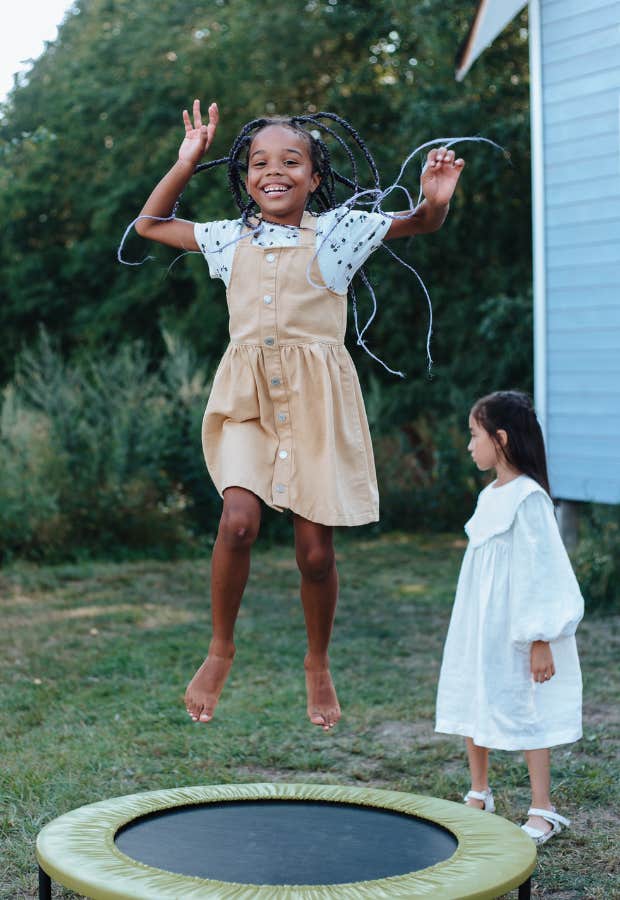Mom Says Neighbor Kids Keep Coming Over To Play With No Parents In Sight— 'No One Prepared Me For Parenting The Neighborhood Kids'
There's a delicate balance between supporting kids who need it and protecting your own mental health.
 Ron Lach / Pexels
Ron Lach / Pexels A stay-at-home mom living in a “pretty average suburban neighborhood” wrote to the r/breakingmom subreddit to vent her frustrations about a scenario many other moms in the Reddit community had gone through, regarding impromptu playdates.
Kids from the neighborhood come over to play with 'no parents in sight,' making her responsible for providing care.
She explained that whenever she goes to the backyard with her daughters, both the 4-year-old neighbor living behind their house and the 5-year-old neighbor living next door come over to play, with “no parents in sight.”
Due to the young ages of both kids, the mom feels responsible for watching them, yet having to provide constant guidance and direction has left her feeling tapped out. She said, “I’m at the point now of sending them home because I do not want to watch everyone else’s kids every single time I’m outside.”
She described how the 5-year-old neighbor climbs the fence into their yard to use their trampoline, despite the fact that she’s “told his parents how I am uncomfortable with that in case he gets hurt or if we’re not home.”
 Photo: Ron Lach / Pexels
Photo: Ron Lach / Pexels
“Of course, when I tell them they can’t play today, they don’t listen because they’re 4 and 5,” the mom said, expressing her growing resentment at being held responsible for watching the neighborhood kids.
‘No one prepared me for parenting everyone else’s kids,’ the mom lamented.
Comments from other moms empathized with how challenging that particular situation can be.
Many moms explained that they’d experienced the same thing with kids in their own neighborhoods, offering practical solutions for setting rules for when kids are allowed to come over.
As one mom explained, “You get sent home if you’re fighting. That’s the rule. Otherwise, we cut up enough watermelon to feed whoever is in the yard, we have popsicles and freezies to share. They are only young once.”
She described her own experience setting emotional safeguards to care for her own mental health in regards to unsupervised kids coming over, saying, “It’s a bit exhausting. But I didn’t try to ‘parent’ other kids. That really helped with the stress of it.”
Another mom suggested making signs for the backyard to clearly delineate when it’s okay to come over— one that says, “Friends welcome for playtime,” and one that announces, “We’re having family time, come back later.”
One mom recognized that the situation is inherently “super stressful,” while offering the perspective that “the kids might be a bit neglected and lonely.” Someone else echoed that perspective, saying, “The kids who come running when they hear voices are usually the lonely ones.”
 Photo : Ben Mack / Pexels
Photo : Ben Mack / Pexels
“You might be the only genuinely kind but firm adult they see in their daily life,” they continued. “It's absolutely okay to tell them no to playing, or even set up some kind of rule about how often they can ask, like once a day only.”
Another mom shared her perspective, focusing on the benefits of neighborhood kids playing together. She said, “When your kids are a little older, being able to free range a bit with a pack of neighborhood kids will be awesome.”
She qualified her opinion, saying, “Humans are meant to live in villages, not isolated nuclear families. It sucks that the other parents aren’t pulling their own weight but I wouldn’t want to live in a neighborhood where no one asked to play outside.”
The mom who made the original post agreed, saying, “It’ll be great when they are older… for now, it’s just kind of exhausting even going out to get my mail and the kids just swarm us… I think it’s just the ages they are that make it so hard on me.”
The responses the mom received from other moms showed a commonality of experience, one that hinges on maintaining a delicate balance of showing support to kids who might need it, while also setting emotional and practical boundaries, in order to care for oneself.
Alexandra Blogier is a writer on YourTango's news and entertainment team. She covers parenting, pop culture analysis and all things to do with the entertainment industry.

